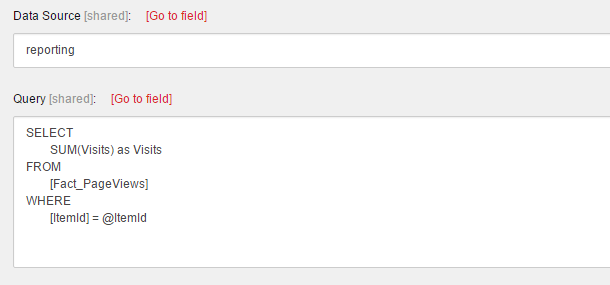Here is how you can do this:
1. Create reporting query item
Create somewhere an item of template /sitecore/templates/System/Analytics/ReportQuery
Example fields configuration:
Write down an item ID somewhere, we will need it later.

2. Create item based reporting query class
Example code:
Note: This Constants.ReportingQueries.ItemVisits is an item ID of your reporting query item, put this into constant or pull from configuration.
public class ExampleVisitsQuery : ItemBasedReportingQuery
{
public ExampleVisitsQuery(ReportDataProviderBase reportProvider = null)
: base(Constants.ReportingQueries.ItemVisits, reportProvider)
{
}
public ID ItemId { get; set; }
public long Visits { get; protected set; }
public override void Execute()
{
var parameters = new Dictionary<string, object>
{
{"@ItemId", ItemId}
};
var dt = this.ExecuteQuery(parameters);
if (dt != null && dt.Rows.Count > 0)
{
var result = dt.Rows[0]["Visits"];
if (result != null && result != DBNull.Value)
Visits = (long)dt.Rows[0]["Visits"];
}
}
}
3. Get your data
This is where we get the data.
var query = new ExampleVisitsQuery (this.ReportDataProvider)
{
ItemId = id
};
query.Execute();
long itemViews = query.Visits;
Note:
this.ReportDataProvider is an instance of ReportDataProviderBase type.
In this can be null
As a output you get number of views.
4. Sort your data
Once you get Visits for all items you can easily sort them.
Assuming you have got a list of items ids as an input here is what you can do:
if (entryIds.Any())
{
var views = new Dictionary<ID, long>();
foreach (var id in entryIds)
{
var query = new ExampleVisitsQuery(this.ReportDataProvider)
{
ItemId = id
};
query.Execute();
var itemViews = query.Visits;
if (itemViews > 0)
views.Add(id, itemViews);
}
var ids = views.OrderByDescending(x => x.Value).Take(maxCount).Select(x => x.Key).ToArray();
}